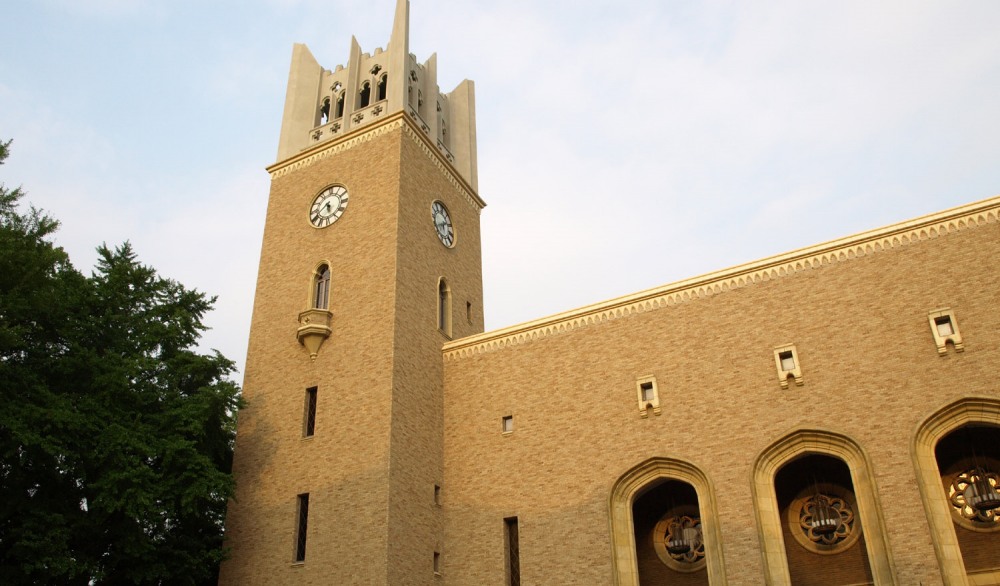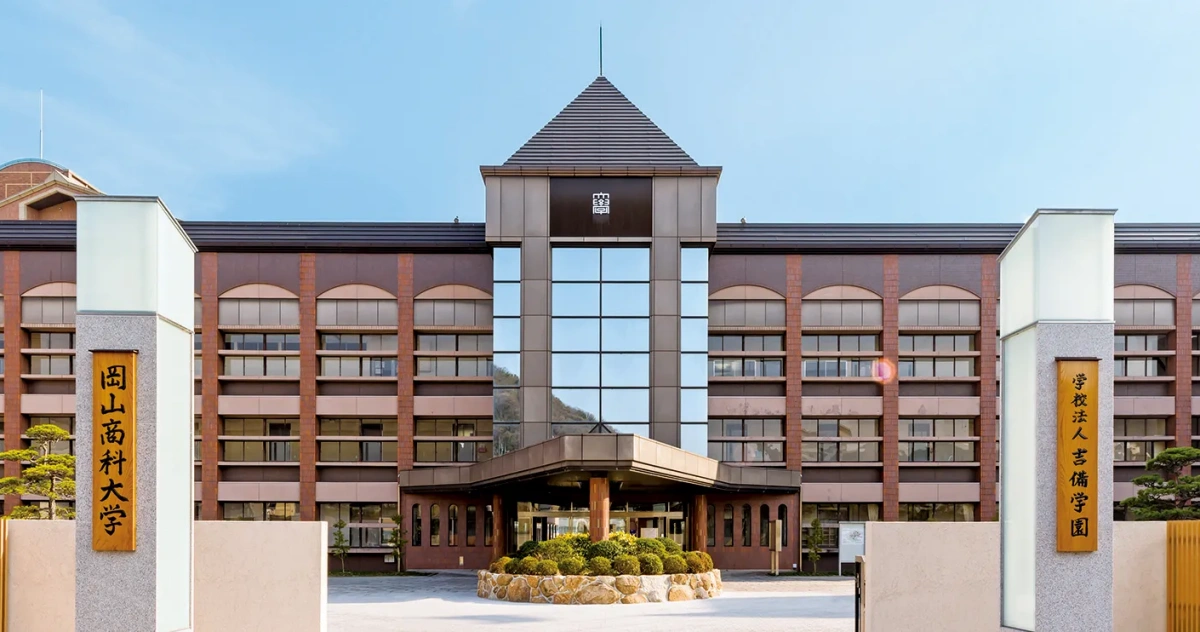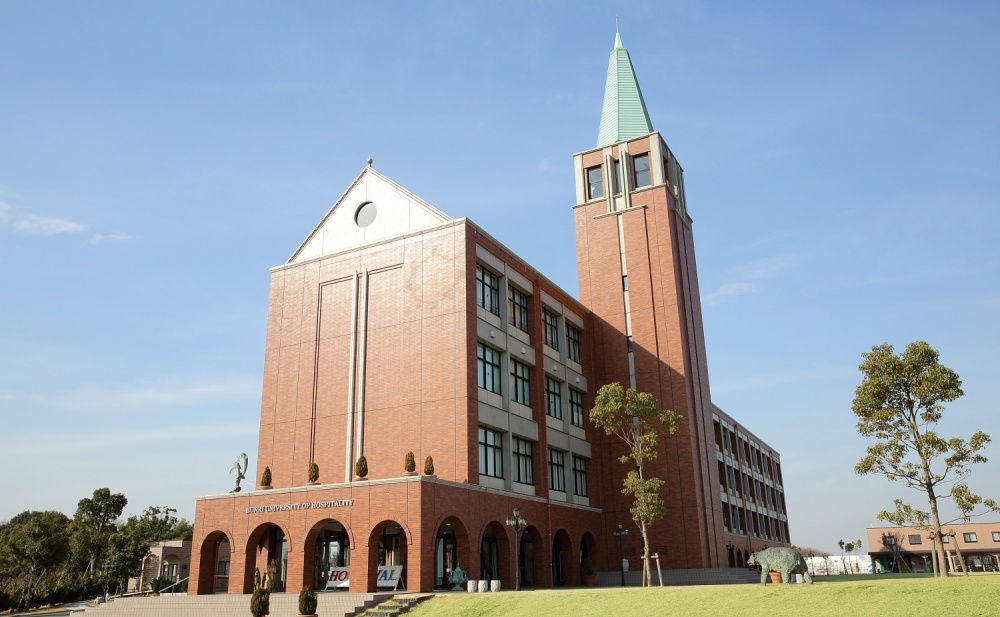
What is the caliber of Tokyo University of Foreign Studies? I wish to comprehend it comprehensively, including its deviation value, tuition fees, majors, and evaluations.
It's reputed that Tokyo University of Foreign Studies maintains a high standard, with a deviation score ranging between 60 to 65, positioning it as one of Japan's premier national universities.
Upon perusing this article, you will grasp the challenges posed by Tokyo University of Foreign Studies and discern the requisites for success.
Tokyo University of Foreign Studies Basic information
Tokyo University of Foreign Studies boasts a rich history dating back to its establishment as Tokyo School of Foreign Languages in 1896. After a brief hiatus in 1920, it was revived in 1930 as an affiliate of what is now known as Hitotsubashi University, named the Foreign Language School of the Higher School of Commerce at the time.
In 1932, it became an independent three-year institution for graduates of junior high schools, named Tokyo School of Foreign Languages. In 1942, it was reorganized into the three-year Tokyo Diplomatic Specialized School, which later evolved into the four-year Tokyo University of Foreign Studies. In 2004, it was reestablished as a national university corporation.
In 2010, the school underwent restructuring, merging the School of Foreign Languages with the School of International and Area Studies to form the College of Language and Culture and the College of International and Area Studies. Additionally, in 1931, the International Japanese Studies Center was established, resulting in the formation of three colleges.
The university is located at 3-11-1 Asahi-cho, Fuchu City, Tokyo 183-8534, and can be contacted at (042) 330-5179 (direct line for admissions).
Faculty:
- Professors: 102
- Associate Professors: 74
- Lecturers: 552 (49 full-time, 503 part-time)
- Assistant Professors: 17
- Additionally, there are 170 foreign faculty members.
Student Body:
- Male: 1,266
- Female: 2,418
- Total: 3,684 students
Tokyo University of Foreign Studies tuition
The following is the tuition fee of Tokyo University of Foreign Studies, which can be seen as the average of national universities.
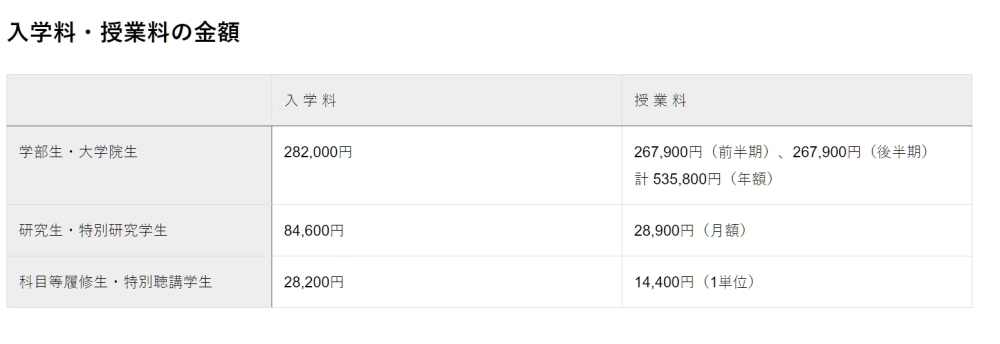
Is Tokyo University of Foreign Studies An Elite University?
Tokyo University of Foreign Studies Deviation Value
The deviation values for various departments at Tokyo University of Foreign Studies are summarized in the table below:
| College/Department | Major | Deviation Value |
|---|---|---|
| College of Language and Culture | English | 65.0 |
| German | 65.0 | |
| Polish/Czech | 65.0 | |
| French | 62.5 | |
| Italian | 62.5 | |
| Spanish | 62.5 | |
| Portuguese | 60.0 | |
| Russian | 60.0 | |
| Russian and Uzbek/Mongolian | 60.0 | |
| Chinese | 62.5 | |
| Korean | 62.5 | |
| Indonesian/Malaysian/Filipino | 62.5 | |
| Thai/Lao/Vietnamese/Cambodian/Burmese | 60.0 | |
| Urdu/Hindi/Bengali | 60.0 | |
| Arabic/Persian/Turkish | 60.0 | |
| College of International and Area Studies | Northwestern Europe/North America | 65.0 |
| Central Europe | 62.5 | |
| Southwest Europe | 65.0 | |
| Iberia/Latin America | 65.0 | |
| Russia | 65.0 | |
| Central Asia | 60.0 | |
| East Asia | 65.0 | |
| Southeast Asia | 62.5 | |
| South Asia | 62.5 | |
| Middle East | 62.5 | |
| Africa | 65.0 | |
| Oceania | 62.5 | |
| College of International Japan Studies | International Japan Studies | 60.0 |
It can be observed that all departments at Tokyo University of Foreign Studies have deviation values exceeding 60 points, which is rare for such an outstanding university.
The Enrollment Multiplier of Tokyo University of Foreign Studies
The entrance examination competition ratios for Tokyo University of Foreign Studies in 2023 are as follows:
| College/Department | Major | Competition Ratio |
|---|---|---|
| College of Language and Culture | English | 1.8 |
| German | 2.2 | |
| Polish/Czech | 1.8 | |
| French | 2.5 | |
| Italian | 2.9 | |
| Spanish | 1.7 | |
| Portuguese | 2.3 | |
| Russian | 1.8 | |
| Russian and Uzbek/Mongolian | 3.5 | |
| Chinese | 2.3 | |
| Korean | 4.4 | |
| Indonesian/Malaysian/Filipino | 2.4 | |
| Thai/Lao/Vietnamese/Cambodian/Burmese | 2.9 | |
| Urdu/Hindi/Bengali | 3.5 | |
| Arabic/Persian/Turkish | 1.9 | |
| College of International and Area Studies | Northwestern Europe/North America | 1.3 |
| Central Europe | 3.8 | |
| Southwest Europe | 1.7 | |
| Iberia/Latin America | 1.3 | |
| Russia | 2.6 | |
| Central Asia | 2.2 | |
| East Asia | 2.3 | |
| Southeast Asia | 2.8 | |
| South Asia | 2.4 | |
| Middle East | 1.5 | |
| Africa | 2.6 | |
| Oceania | 3.2 | |
| College of International Japan Studies | International Japan Studies | 1.5 |
The proficiency levels for each major are fairly balanced, with no significantly undersubscribed programs. The lowest competition ratio observed is 1.3.
Minimum Passing Score at Tokyo University of Foreign Studies
The table below summarizes the minimum passing scores for Tokyo University of Foreign Studies by college/department:
| College/Department | Major | Minimum Passing Score (out of total) |
|---|---|---|
| College of Language and Culture | English | General Test: 345.0/450 Personal Test: 230.2/400 |
| German | General Test: 361.0/450 Personal Test: 252.3/400 | |
| Polish/Czech | General Test: 340.5/450 Personal Test: 259.6/400 | |
| French | General Test: 360.0/450 Personal Test: 238.9/400 | |
| Italian | General Test: 357.0/450 Personal Test: 253.2/400 | |
| Spanish | General Test: 334.0/450 Personal Test: 228.8/400 | |
| Portuguese | General Test: 355.5/450 Personal Test: 243.6/400 | |
| Russian | General Test: 330.0/450 Personal Test: 229.5/400 | |
| Russian and Uzbek/Mongolian | General Test: 337.5/450 Personal Test: 255.5/400 | |
| Chinese | General Test: 360.5/450 Personal Test: 227.2/400 | |
| Korean | General Test: 352.0/450 Personal Test: 265.1/400 | |
| Indonesian/Malaysian/Filipino | General Test: 333.0/450 Personal Test: 229.0/400 | |
| Thai/Lao/Vietnamese/Cambodian/Burmese | General Test: 341.5/450 Personal Test: 219.7/400 | |
| Urdu/Hindi/Bengali | General Test: 332.0/450 Personal Test: 223.6/400 | |
| Arabic/Persian/Turkish | General Test: 345.0/450 Personal Test: 225.0/400 | |
| College of International and Area Studies | Northwestern Europe/North America | General Test: 360.0/450 Personal Test: 278.6/400 |
| Central Europe | General Test: 343.0/450 Personal Test: 204.6/400 | |
| Southwest Europe | General Test: 335.5/450 Personal Test: 242.7/400 | |
| Iberia/Latin America | General Test: 335.5/450 Personal Test: 223.8/400 | |
| Russia | General Test: 349.5/450 Personal Test: 239.6/400 | |
| Central Asia | General Test: 342.0/450 Personal Test: 217.6/400 | |
| East Asia | General Test: 358.5/450 Personal Test: 224.3/400 | |
| Southeast Asia | General Test: 339.0/450 Personal Test: 218.9/400 | |
| South Asia | General Test: 354.5/450 Personal Test: 239.8/400 | |
| Middle East | General Test: 316.5/450 Personal Test: 229.0/400 | |
| Africa | General Test: 342.0/450 Personal Test: 275.3/400 | |
| Oceania | General Test: 358.5/450 Personal Test: 290.5/400 | |
| College of International Japan Studies | International Japan Studies | General Test: 328.0/450 Personal Test: 236.6/400 |
It can be observed that the minimum scores are quite low, so even if your general test scores are around 70%, you can pass if you achieve a score in the personal test.
Career opportunities at Tokyo University of Foreign Studies
Tokyo University of Foreign Studies' employment records disclose only major employment opportunities.
The main employment opportunities are shown in the chart below.
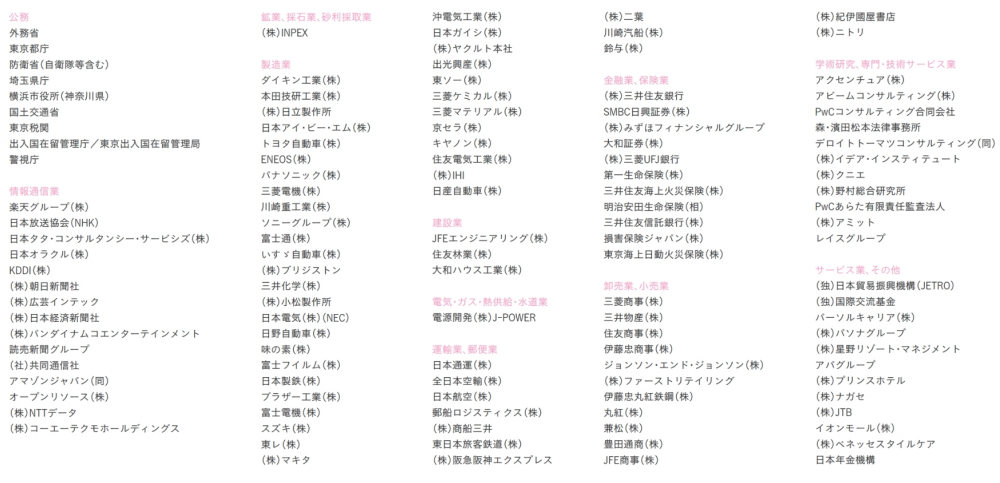
If you would like to know about employment opportunities by faculty and by grade, please visit "Employment Results" on the Tokyo University of Foreign Studies website.
Positioning of Tokyo University of Foreign Studies
According to the ranking of Japanese universities by the Institute of University Standards, Tokyo University of Foreign Studies is ranked 6th.
As the 6th highest deviation value score in Japan, this is a fairly high level university.
How to study to pass the high-level Tokyo University of Foreign Studies
If you are going to take the entrance exam for Tokyo University of Foreign Studies, it is best to major in English level.
This is because foreign language scores account for more than 50 percent of the total score in the entrance exam.
For example, the entrance examination system for the Department of International Sociology in the Division of International Society is shown in the figure below.
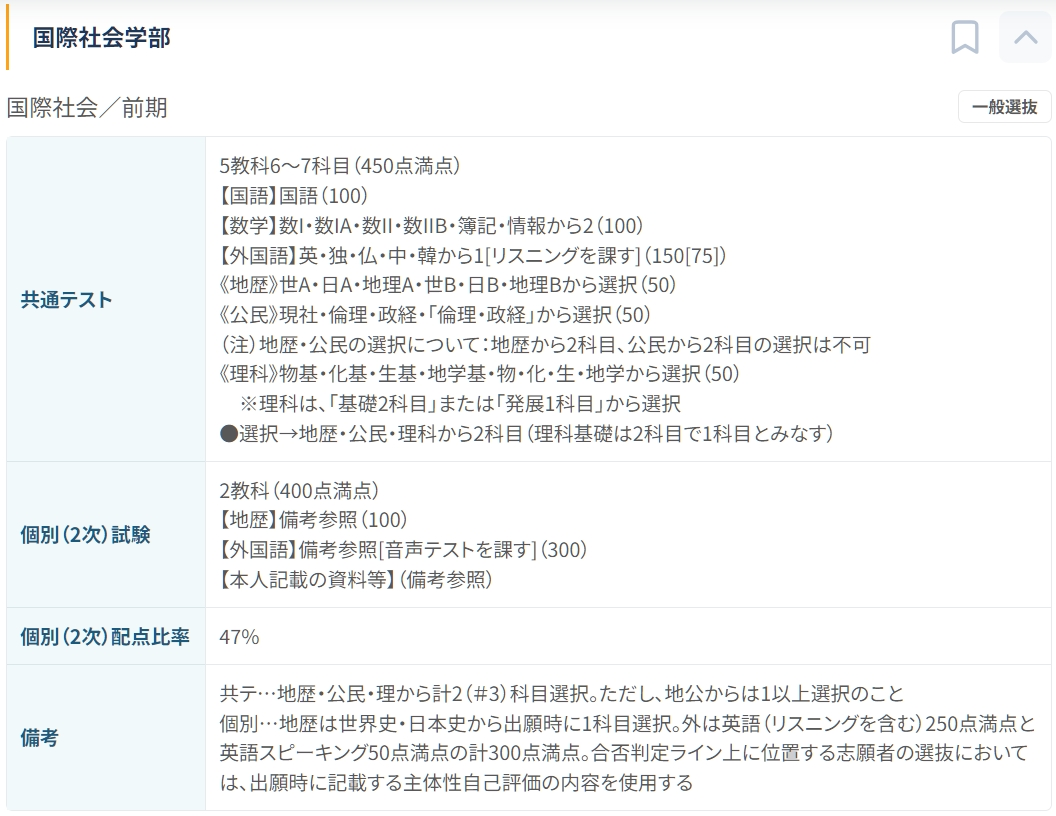
Full score 950, foreign language 500. It is no exaggeration to say that your success or failure will depend on your level of English.
Tokyo University of Foreign Studies
Tokyo University of Foreign Studies Review ① Male / Language and Culture College, Department of Language and Culture / Current Student / Enrolled in 2023
Overall Evaluation: Learning is divided into three stages: introductory, overview, and specialized. Not only can you learn languages, but also culture. However, since the foundation is language-based, there won't be significant differences in learning due to language, culture, or international society.
Lectures/Classes: High quality. Almost all classes have people from other countries, allowing you to understand international affairs in a practical manner.
Employment/Promotion: Trade companies, banks, consulting firms, and more. In fact, some of my seniors have been hired by the international sales departments of major Japanese companies, making the employment environment very fulfilling.
Transportation/Location: It's somewhat rural. As expected, the nearest station, Tama Station, is on the Seibu Tamako Line, which is a local line, so transportation can be a bit challenging.
Facilities/Equipment: Basically, it hasn't had any negative impact on my studies, and I'm satisfied. However, there is a shortage of power outlets in the classrooms.
Friends/Romance: I believe that if you proactively approach others, you can build friendships with an international flavor. My impression is that there are quite a few people in relationships.
Student Life: The Foreign Language Festival held in autumn is one of the most popular events in Japan and a very fun activity to deepen friendships within the language department. I'm quite active in club activities, but the requirements aren't too high, so I feel I can enjoy them.
Tokyo University of Foreign Studies Review ② Female / Language and Culture College, Department of Language and Culture / Current Student / Enrolled in 2023
Overall Evaluation: In a nutshell, it's the best. I'm very happy to be attending this school. My friends are all great, and my communication skills have improved.
Lectures/Classes: The teachers are interesting! Not only can you learn languages, but also culture!
Employment/Promotion: With excellent academic performance and generous support for job hunting, you can comfortably get through the third year.
Transportation/Location: Within a 5-minute walk to the train station! There's a real estate agent nearby, so you can find a nice single-family residence.
Facilities/Equipment: The school is clean, and the facilities are comprehensive, with counters available for study along the way.
Friends/Romance: I have good friends in the department, and also good friends with the teachers, so we chat a lot and learn a lot!
Student Life: The school is really fun. The gym facilities are comprehensive, so doing laps is also nice.


